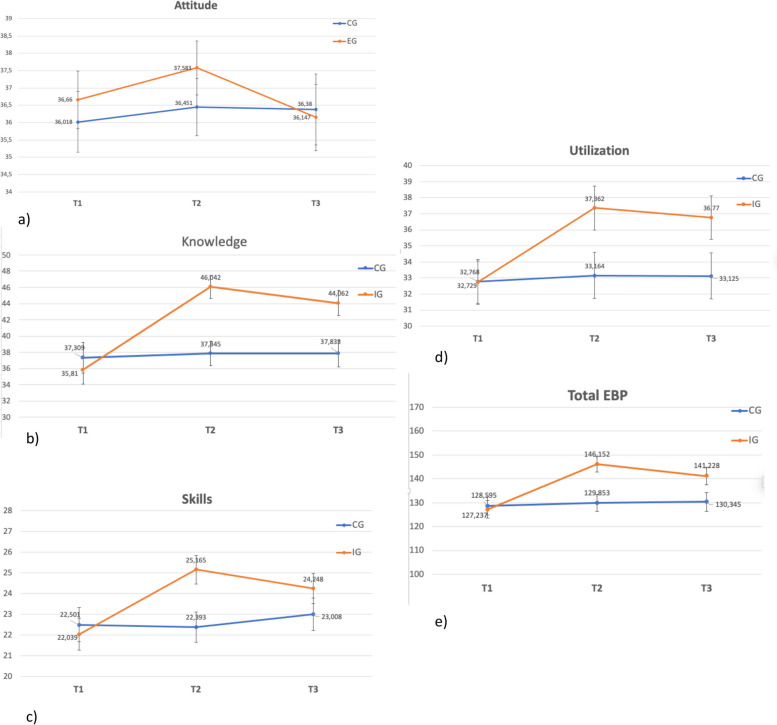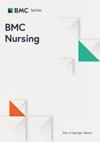Antonio Jesús Ramos-Morcillo, Maria Ruzafa-Martínez, César Leal-Costa, Serafin Fernández-Salazar
下载PDF
{"title":"在线培训干预对临床护士循证实践的影响。#Evidencer项目。","authors":"Antonio Jesús Ramos-Morcillo, Maria Ruzafa-Martínez, César Leal-Costa, Serafin Fernández-Salazar","doi":"10.1186/s12912-024-02489-5","DOIUrl":null,"url":null,"abstract":"<p><strong>Background: </strong>Online learning is becoming increasingly essential for health professionals, and it is necessary to understand how this modality affects clinical nurses' learning of Evidence-Based Practice (EBP). For this reason, the present study sought to assess the effectiveness of an online training program in improving nurses' EBP competence.</p><p><strong>Methods: </strong>A quasi-experimental study with a pretest-posttest design was conducted with a control group and without randomization for a period of 6 months. The intervention was an online self-learning course based on Melnyk's seven steps of Evidence-Based Practice (EBP). The course was structured into sequential modules requiring 72 h of work, with task completions and tests necessary for progression. Participants had three months to complete the course. EBP competence was measured with the EBP-COQ Prof© questionnaire. Data analysis included percentages, means, standard deviations, chi-square tests, student's t-tests, and a two-way repeated measures analysis of covariance (ANCOVA).</p><p><strong>Results: </strong>The analysis of the changes observed in each dimension and the overall EBP competence between the intervention group (IG) and the control group (CG) showed a significant group*time interaction in three of the four dimensions of the questionnaire. The results indicated that the online Evidence-Based Practice (EBP) course significantly improved knowledge, skills, and utilization three months after its completion. In the IG, the mean score was 44.04 (standard deviation (SD) = 7), compared to 37.83 (SD = 8.5) in the CG (p < 0.001). Regarding skills, the IG had a mean score of 24.24 (SD = 3.8), while the CG scored 23.01 (SD = 3.1) (p = 0.008). For utilization, the mean score in the IG was 36.77 (SD = 6.8), and the CG was 33.12 (SD = 6.3) (p = 0.005). Overall competence also showed a statistically significant difference, with the IG achieving a mean score of 141.22 (SD = 20.0) compared to the CG with a mean score of 130.34 (SD = 16.7) (p < 0.001).</p><p><strong>Conclusions: </strong>Training through an online education platform for three months (72 h) is an effective tool for improving the competence in Evidence-Based Practice (EBP) of clinical nurses. A significant increase was observed in knowledge and moderate improvements in skills and the application of EBP. These online courses, adapted to the needs of professionals, can be an efficient way to prepare nurses and improve their application of EBP in a clinical setting.</p>","PeriodicalId":48580,"journal":{"name":"BMC Nursing","volume":"23 1","pages":"838"},"PeriodicalIF":3.9000,"publicationDate":"2024-11-15","publicationTypes":"Journal Article","fieldsOfStudy":null,"isOpenAccess":false,"openAccessPdf":"https://www.ncbi.nlm.nih.gov/pmc/articles/PMC11566661/pdf/","citationCount":"0","resultStr":"{\"title\":\"Effect of an online training intervention on evidence-based practice in clinical nurses. #Evidencer Project.\",\"authors\":\"Antonio Jesús Ramos-Morcillo, Maria Ruzafa-Martínez, César Leal-Costa, Serafin Fernández-Salazar\",\"doi\":\"10.1186/s12912-024-02489-5\",\"DOIUrl\":null,\"url\":null,\"abstract\":\"<p><strong>Background: </strong>Online learning is becoming increasingly essential for health professionals, and it is necessary to understand how this modality affects clinical nurses' learning of Evidence-Based Practice (EBP). For this reason, the present study sought to assess the effectiveness of an online training program in improving nurses' EBP competence.</p><p><strong>Methods: </strong>A quasi-experimental study with a pretest-posttest design was conducted with a control group and without randomization for a period of 6 months. The intervention was an online self-learning course based on Melnyk's seven steps of Evidence-Based Practice (EBP). The course was structured into sequential modules requiring 72 h of work, with task completions and tests necessary for progression. Participants had three months to complete the course. EBP competence was measured with the EBP-COQ Prof© questionnaire. Data analysis included percentages, means, standard deviations, chi-square tests, student's t-tests, and a two-way repeated measures analysis of covariance (ANCOVA).</p><p><strong>Results: </strong>The analysis of the changes observed in each dimension and the overall EBP competence between the intervention group (IG) and the control group (CG) showed a significant group*time interaction in three of the four dimensions of the questionnaire. The results indicated that the online Evidence-Based Practice (EBP) course significantly improved knowledge, skills, and utilization three months after its completion. In the IG, the mean score was 44.04 (standard deviation (SD) = 7), compared to 37.83 (SD = 8.5) in the CG (p < 0.001). Regarding skills, the IG had a mean score of 24.24 (SD = 3.8), while the CG scored 23.01 (SD = 3.1) (p = 0.008). For utilization, the mean score in the IG was 36.77 (SD = 6.8), and the CG was 33.12 (SD = 6.3) (p = 0.005). Overall competence also showed a statistically significant difference, with the IG achieving a mean score of 141.22 (SD = 20.0) compared to the CG with a mean score of 130.34 (SD = 16.7) (p < 0.001).</p><p><strong>Conclusions: </strong>Training through an online education platform for three months (72 h) is an effective tool for improving the competence in Evidence-Based Practice (EBP) of clinical nurses. A significant increase was observed in knowledge and moderate improvements in skills and the application of EBP. These online courses, adapted to the needs of professionals, can be an efficient way to prepare nurses and improve their application of EBP in a clinical setting.</p>\",\"PeriodicalId\":48580,\"journal\":{\"name\":\"BMC Nursing\",\"volume\":\"23 1\",\"pages\":\"838\"},\"PeriodicalIF\":3.9000,\"publicationDate\":\"2024-11-15\",\"publicationTypes\":\"Journal Article\",\"fieldsOfStudy\":null,\"isOpenAccess\":false,\"openAccessPdf\":\"https://www.ncbi.nlm.nih.gov/pmc/articles/PMC11566661/pdf/\",\"citationCount\":\"0\",\"resultStr\":null,\"platform\":\"Semanticscholar\",\"paperid\":null,\"PeriodicalName\":\"BMC Nursing\",\"FirstCategoryId\":\"3\",\"ListUrlMain\":\"https://doi.org/10.1186/s12912-024-02489-5\",\"RegionNum\":2,\"RegionCategory\":\"医学\",\"ArticlePicture\":[],\"TitleCN\":null,\"AbstractTextCN\":null,\"PMCID\":null,\"EPubDate\":\"\",\"PubModel\":\"\",\"JCR\":\"Q1\",\"JCRName\":\"NURSING\",\"Score\":null,\"Total\":0}","platform":"Semanticscholar","paperid":null,"PeriodicalName":"BMC Nursing","FirstCategoryId":"3","ListUrlMain":"https://doi.org/10.1186/s12912-024-02489-5","RegionNum":2,"RegionCategory":"医学","ArticlePicture":[],"TitleCN":null,"AbstractTextCN":null,"PMCID":null,"EPubDate":"","PubModel":"","JCR":"Q1","JCRName":"NURSING","Score":null,"Total":0}
引用次数: 0
引用
批量引用
Effect of an online training intervention on evidence-based practice in clinical nurses. #Evidencer Project.
Background: Online learning is becoming increasingly essential for health professionals, and it is necessary to understand how this modality affects clinical nurses' learning of Evidence-Based Practice (EBP). For this reason, the present study sought to assess the effectiveness of an online training program in improving nurses' EBP competence.
Methods: A quasi-experimental study with a pretest-posttest design was conducted with a control group and without randomization for a period of 6 months. The intervention was an online self-learning course based on Melnyk's seven steps of Evidence-Based Practice (EBP). The course was structured into sequential modules requiring 72 h of work, with task completions and tests necessary for progression. Participants had three months to complete the course. EBP competence was measured with the EBP-COQ Prof© questionnaire. Data analysis included percentages, means, standard deviations, chi-square tests, student's t-tests, and a two-way repeated measures analysis of covariance (ANCOVA).
Results: The analysis of the changes observed in each dimension and the overall EBP competence between the intervention group (IG) and the control group (CG) showed a significant group*time interaction in three of the four dimensions of the questionnaire. The results indicated that the online Evidence-Based Practice (EBP) course significantly improved knowledge, skills, and utilization three months after its completion. In the IG, the mean score was 44.04 (standard deviation (SD) = 7), compared to 37.83 (SD = 8.5) in the CG (p < 0.001). Regarding skills, the IG had a mean score of 24.24 (SD = 3.8), while the CG scored 23.01 (SD = 3.1) (p = 0.008). For utilization, the mean score in the IG was 36.77 (SD = 6.8), and the CG was 33.12 (SD = 6.3) (p = 0.005). Overall competence also showed a statistically significant difference, with the IG achieving a mean score of 141.22 (SD = 20.0) compared to the CG with a mean score of 130.34 (SD = 16.7) (p < 0.001).
Conclusions: Training through an online education platform for three months (72 h) is an effective tool for improving the competence in Evidence-Based Practice (EBP) of clinical nurses. A significant increase was observed in knowledge and moderate improvements in skills and the application of EBP. These online courses, adapted to the needs of professionals, can be an efficient way to prepare nurses and improve their application of EBP in a clinical setting.


 求助内容:
求助内容: 应助结果提醒方式:
应助结果提醒方式:


